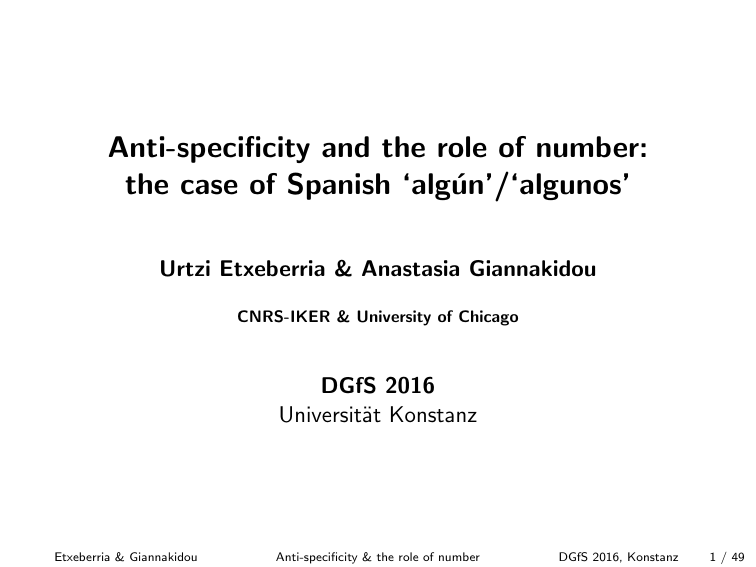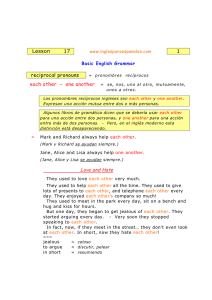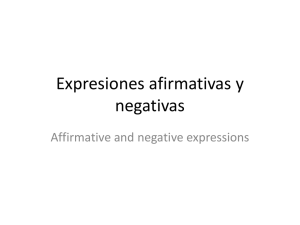Anti-specificity and the role of number: the case of Spanish `algún
Anuncio

Anti-specificity and the role of number: the case of Spanish ‘algún’/‘algunos’ Urtzi Etxeberria & Anastasia Giannakidou CNRS-IKER & University of Chicago . DGfS 2016 Universität Konstanz Etxeberria & Giannakidou Anti-specificity & the role of number DGfS 2016, Konstanz 1 / 49 Introduction Indefinites: specific vs non-specific Indefinites: specific vs non-specific Indefinite NPs can get two interpretations: specific and non-specific (example taken from Fodor & Sag 1982). (1) A student in Syntax 1 cheated on the exam. 1 His name is John. 2 We are all trying to figure out who it was. Etxeberria & Giannakidou Anti-specificity & the role of number DGfS 2016, Konstanz 2 / 49 Introduction Indefinites: specific vs non-specific Specific indefinites The speaker knows the identity of the referent, knows who. The referent is fixed / determined / independent the interpretation of the matrix predicate. Specific indefinite NPs are ‘scopeless’, ‘referential’, or topics. Specific indefinite NPs can be marked by specificity markers. [cf. Fodor & Sag 1981, Groenendijk & Stokhof 1984, Reinhart 1998, Winter 1997, Farkas 2002, von Heusinger 2011, Hinterwimmer & Umbach to appear, Ionin 1996, Endriss 2009, a.o.] Etxeberria & Giannakidou Anti-specificity & the role of number DGfS 2016, Konstanz 3 / 49 Introduction Indefinites: specific vs non-specific Indefinites: specific vs non-specific (2) Every tourist visited a museum. 1 [8x: tourist (x)] [9y: museum (y)] [visited (x, y)] (narrow scope, non-specific reading, varying values) 2 [9y: museum (y)] [8x: tourist (x)] [visited (x, y)] (inverse wide scope, specific reading, fixed value) Specific reading: In the specific reading the speaker has one museum in mind. " operator, choice function, however one is to capture that. Etxeberria & Giannakidou Anti-specificity & the role of number DGfS 2016, Konstanz 4 / 49 Introduction Indefinites: specific vs non-specific Specificity markers (3) Every tourist visited a certain museum, namely the Louvre. (4) # Every tourist visited a certain museum, possibly di↵erent ones. Specificity marking: Specificity marking can be quite systematic, and can involve case marking (as in Turkish, Finish, etc.), and similar devices. Etxeberria & Giannakidou Anti-specificity & the role of number DGfS 2016, Konstanz 5 / 49 Introduction Indefinites: specific vs non-specific Three lessons from specificity Not all indefinites are created equal. Specificity marking constrains the interpretation of the indefinite. In specificity, the question of scope largely depends on epistemic judgment of the speaker (knowing who, being able to identify a unique value). Etxeberria & Giannakidou Anti-specificity & the role of number DGfS 2016, Konstanz 6 / 49 Introduction Indefinites: specific vs non-specific Anti-specificity Anti-specificity (Giannakidou & Quer 2013 Still depending on the speaker. Not knowing who (= choice). Narrow scope with respect to Q- and intensional operators. Systematic anti-specificity marking in language (via determiners, case, etc.) Etxeberria & Giannakidou Anti-specificity & the role of number DGfS 2016, Konstanz 7 / 49 Introduction Indefinites: specific vs non-specific Anti-specificity: examples E.g. German: (5) Ingerjemand hat angerufen. #Rat mal wer! somebody has called guess prt who Somebody called. #Guess who! (Aloni & Port 2014) E.g. Spanish: (6) Ha llamado algún estudiante. #Adivina quién Some student called. #Guess who! Somebody called. #Guess who! (Giannakidou & Quer 2013) [cf. Giannakidou & Quer 2013, Alonso-Ovalle & Menéndez-Benito 2010, 2013, Giannakidou & Yoon 2014, to appear, Etxeberria & Giannakidou 2014, to appear, Eckardt 2007, Aloni & Port 2011, 2014, Kratzer & Shimoyama 2002, Zamparelli 2007, Jayez & Tovena 2007, a.o.] Etxeberria & Giannakidou Anti-specificity & the role of number DGfS 2016, Konstanz 8 / 49 Introduction Indefinites: specific vs non-specific Anti-specificity: examples E.g. Italian un qualche: (7) Maria ha sposato un qualche professore. #Cioè Vito. Maria has married un qualche professor #namely Vito Maria married some professor. #Namely Vito. (Aloni & Port 2013) E.g. Korean amwu/nwukwu: (8) Na-nun enehak kyoswu amwu/nwukwu-rato manna-ko sip-ta. I-Top linguistics professor NPI meet-C want-decl #Kukes-un ceki ce namca-ta. it-Top there that guy-Decl I want to meet some linguistics professor or other. #It’s that guy over there. (Giannakidou & Yoon 2014, to appear) [cf. Giannakidou & Quer 2013, Alonso-Ovalle & Menéndez-Benito 2010, 2013, Giannakidou & Yoon 2014, to appear, Etxeberria & Giannakidou 2014, to appear, Eckardt 2007, Aloni & Port 2011, 2014, Kratzer & Shimoyama 2002, Zamparelli 2007, Jayez & Tovena 2007, a.o.] Etxeberria & Giannakidou Anti-specificity & the role of number DGfS 2016, Konstanz 9 / 49 Introduction The puzzle The puzzle The existential indefinite determiners algún/algunos in Spanish show conflicting behavior: singular algún is an anti-specific determiner. [cf. Giannakidou & Quer 2013; see also Alonso-Ovalle & Menéndez-Benito 2010, 2013a, ’epistemic indefinites’; etc.] plural algunos behaves like a specific determiner. [cf. Gutiérrez-Rexach 1999, 2001; Alonso-Ovalle & Menéndez-Benito 2002, 2010, 2013b; Laca & Tasmowski 1996; Martı́ 2005, 2009; Villalta 1994; etc.] How can the two be reconciled without positing ambiguity? Etxeberria & Giannakidou Anti-specificity & the role of number DGfS 2016, Konstanz 10 / 49 Introduction Our proposal (I) Our proposal (I) The paradoxical behavior is illusory. Algún is always anti-specific, in particular ‘referentially vague’ (Giannakidou & Quer 2013). Plural algunos is not specific. In fact, we argue that plural algunos is also ‘referentially vague’. If there is a previously introduced set, an anaphoric plural will be licensed like e.g. English ones in elliptical contexts (Kester 1996). It is the anaphoric plural that gives rise to the ’specificity’ feeling, which is in fact property anaphora. Etxeberria & Giannakidou Anti-specificity & the role of number DGfS 2016, Konstanz 11 / 49 Spanish indefinites Singular ‘algún’ Singular ‘algún’ Methods of identification (Aloni & Port 2010): ...Ostension: (9) Tengo have señor guy que leer un artı́culo de algún profesor. #Es aquel comp read a article of some professor is that de allı́. of there I have to read an article of some professor (or other). #It’s that guy over there. Etxeberria & Giannakidou Anti-specificity & the role of number DGfS 2016, Konstanz 12 / 49 Spanish indefinites Singular ‘algún’ Singular ‘algún’ Methods of identification (Aloni & Port 2010): ...Naming: (10) Tengo que quedar con algún profesor. #Se llama Bob have comp meet with some professor se call Bob Smith. Smith I have to meet with some professor (or other). #His name is Bob Smith. Etxeberria & Giannakidou Anti-specificity & the role of number DGfS 2016, Konstanz 13 / 49 Spanish indefinites Singular ‘algún’ Singular ‘algún’ Methods of identification (Aloni & Port 2010): ...Description: (11) Tengo que quedar con algún profesor. #Es el director have comp meet with some professor is the director del Departamento de Filosofı́a. of-the Department of Philosophy I have to meet with some professor (or other). #He is the head of the Philosophy Department. Etxeberria & Giannakidou Anti-specificity & the role of number DGfS 2016, Konstanz 14 / 49 Spanish indefinites Singular ‘algún’ Singular ‘algún’ Methods of identification (Haspelmath 1997): ...‘Guess who’ test: (12) Ha llamado algún estudiante. #Adivina quién have called some student. #Guess who! Somebody called. #Guess who! Etxeberria & Giannakidou Anti-specificity & the role of number DGfS 2016, Konstanz 15 / 49 Spanish indefinites Singular ‘algún’ algún vs un If the speaker knows who the referent is: un is fine. algún is not fine. (13) a. Ha llamado algún estudiante. #¡Adivina quién! b. Ha llamado un estudiante. ¡Adivina quién! ‘Algún/Un student called. Guess who!’ Etxeberria & Giannakidou Anti-specificity & the role of number DGfS 2016, Konstanz 16 / 49 Spanish indefinites Plural ‘algunos’ Plural ‘algunos’ Behavior of ‘algunos’: Plural algunos has been claimed to behave specifically. It is necessarily linked to a previously introduced antecedent (cf. Martı́ 2008, 2009). Distinguished from unos, which is the unmarked plural indefinite. Etxeberria & Giannakidou Anti-specificity & the role of number DGfS 2016, Konstanz 17 / 49 Spanish indefinites Plural ‘algunos’ Plural ‘algunos’ Algunos can give raise to ‘specific’-like interpretations. (14) Teachers A and B are on an excursion with [a group of children, of whom they are in charge]K . Teacher A comes to teacher B running: Teacher A: ¿Te has enterado? [Algunos niños]K ,#J se han perdido en el bosque. ‘Have you heard? Algunos children got lost in the forest.’ (Martı́ 2009: 110) algunos alg Algunos appears to require familiarity, i.e. it requires a familiar index. Etxeberria & Giannakidou Anti-specificity & the role of number DGfS 2016, Konstanz 18 / 49 Spanish indefinites Plural ‘algunos’ Plural ‘algunos’ Algunos can give raise to ‘specific’-like interpretations. (15) Se salvaron doce pasajeros. Algunos estaban durmiendo en el momento del accidente. ‘Twelve passengers were saved. Algunos were sleeping at the time of the accident.’ (Leonetti 1999: 842) (16) A and B are mathematicians at the university in Saarbrücken. A comes to B running. Children have not been on their minds or conversations for a long time: 1 ¿Sabes qué? ¡Algunos niños han conseguido resolver la conjetura de Poincaré! ‘You know what? Algunos children have managed to solve Poincaré’s conjecture!’ (Martı́ 2009: (8)) Etxeberria & Giannakidou Anti-specificity & the role of number DGfS 2016, Konstanz 19 / 49 Spanish indefinites Plural ‘algunos’ Plural ‘algunos’ Algunos may also convey referential vagueness. (17) Context: A class of students is leaving on a summer camp. Instructor A knows all of them because they are former students. Instructor B doesn’t know them at all because it is the first day of his new job. Instructor B says to instructor A: 1 Algunos alumnos han llegado tarde. #Eran Judit, Pedro y Mónica ‘Algunos students came late. Namely Judit, Pedro and Mónica.’ Etxeberria & Giannakidou Anti-specificity & the role of number DGfS 2016, Konstanz 20 / 49 Referential Vagueness Definition Referential vagueness: definition Giannakidou & Quer 2013: 1 A sentence containing a referentially vague indefinite ↵ will have a truth value i↵: 9 w1 , w2 2 W: [[↵]]w 1 6= [[↵]]w 2 ; where ↵ is the referentially vague indefinite. 2 The worlds w1 , w2 are epistemic alternatives of the speaker: w1 , w2 2 M(speaker), where M(speaker) is the speaker’s belief state, the set of worlds compatible with what she believes/knows. 3 The speaker does not know which one the actual value is. Vagueness, indeterminacy of reference. Etxeberria & Giannakidou Anti-specificity & the role of number DGfS 2016, Konstanz 21 / 49 Referential Vagueness Definition Referential vagueness: definition (18) [[Marı́a salió con algún lingüista]] will be defined in c, only if: 9 w1 , w2 2 MB (s) : [[↵]]w 1 6= [[↵]]w 2 , where ↵ is the referentially vague variable; if defined, [[Marı́a salió con algún lingüista]] is true if there is at least one assignment g that verifies the condition linguist (x) ^ date (m,x). (19) Particular individual in mind = fixed value in MB (s): w1 ! Bill, w2 ! Bill, w3 ! Bill, w4 ! Bill (20) No particular individual in mind = no fixed value in MB (s): w1 ! Bill, w2 ! Nicolas, w3 ! John, w4 ! ? Etxeberria & Giannakidou Anti-specificity & the role of number DGfS 2016, Konstanz 22 / 49 Referential Vagueness Anti-singleton constraint Anti-singleton constraint Alonso-Ovalle & Menéndez-Benito 2010: [[algún]] = f<et,et> P <et> Q <et> : Anti-singleton(f ).9x[f(P)(x) & Q(x)]] Anti-singleton is not enough: (21) Context: I am pointing to two rooms, and say: Juan se ha escondido en #alguna/una habitación, pero no estoy segura de cuál. Juan hid in #some/a room, but I’m not sure which one. (GQ 2013) So we need at least two, and not simply more than one. Etxeberria & Giannakidou Anti-specificity & the role of number DGfS 2016, Konstanz 23 / 49 Referential Vagueness Plural ‘algunos’ Plural ‘algunos’ (22) Teachers A and B are on an excursion with [a group of children, of whom they are in charge]K . Teacher A comes to teacher B running: 1 Teacher A: ¿Te has enterado? [Algunos niños]K ,#J se han perdido en el bosque. 2 Teacher A: ¿Te has enterado? [Unos niños]K ,J se han perdido en el bosque. ‘Have you heard? Algunos children got lost in the forest.’ (Martı́ 2009: 110) Algunos vs Unos Unos is neutral with respect to indices. Algunos appears to require familiarity, i.e. it requires a familiar index. Etxeberria & Giannakidou Anti-specificity & the role of number DGfS 2016, Konstanz 24 / 49 Referential Vagueness Plural ‘algunos’ Plural ‘algunos’ (23) A and B work at an agency for the prevention of car accidents. A is already at work, and B is just now arriving, and he is quite agitated. Children have not been on their minds or conversations for a long time: 1 2 ¡Dios mı́o! #¡Algunos niños están jugando demasiado cerca de la carretera! ¡Dios mı́o! ¡Unos niños están jugando demasiado cerca de la carretera! ‘Oh my God! Unos/algunos children are playing too close to the road!’ (Martı́ 2009: (9)) Martı́ (2009: 113): ‘...appreciate the di↵erence between unos and algunos by considering contexts which make no entity available for future reference. In such contexts, it is impossible to use algunos, though sentences with unos are felicitous.’ Etxeberria & Giannakidou Anti-specificity & the role of number DGfS 2016, Konstanz 25 / 49 Referential Vagueness Martı́ 2008, 2009 Martı́ 2008, 2009 Algunos gives rise to a partitivity implicature. (24) [[unos]] = P<et> Q<et> .9x [Mol(x) & P(x) & Q(x)] [[unos]] = (‘Mol’ stands for ‘molecular/plural individual’) (25) [[alg-]] = R<et<ett>> . P<et> . Q<et> :R(P\C)(Q) [[alg-]] = Implicature: R(P\C)(Q)(x: Q(x) = ;) (26) [[algunos]] [[algunos]] [[algunos]] [[algunos]] = = = = P<et> . Q<et> : [[unos]](P)(Q) Implicature: [[unos]](P)(x: Q(x) = ;) P<et> . Q<et> : 9x [Mol(x) & P(x) & Q(x)] Implicature: 9x [Mol(x) & P(x) & Q(x)] = ; Source of partitivity: alg-, which introduces the context variable C. Etxeberria & Giannakidou Anti-specificity & the role of number DGfS 2016, Konstanz 26 / 49 Referential Vagueness Martı́ 2008, 2009 Martı́ 2008, 2009: problems But can that be right? How can alg- contribute both ‘partitivity’ and ‘referential vagueness’, or in other words, both ‘specificity’ and ‘anti-specificity’ ? Martı́’s (2009) analysis cannot handle this. It needs to give up the compositional derivation for alg- in the singular, and therefore posit ambiguity. Etxeberria & Giannakidou Anti-specificity & the role of number DGfS 2016, Konstanz 27 / 49 Referential Vagueness Martı́ 2008, 2009 Martı́ 2008, 2009: problems But ambiguity is undesirable, because The same morphology (alg-) is used in both cases, and Ambiguity doesn’t capture the role of number. Etxeberria & Giannakidou Anti-specificity & the role of number DGfS 2016, Konstanz 28 / 49 Referential Vagueness Martı́ 2008, 2009 Contra partitivity: existential sentences Algunos in existential sentences is equivalent to unos (Gutierrez-Rexach 2001). (27) Context: Upon arriving at the school and seeing several groups of boys fighting, the principal, tired and sick of seeing the same scene every day, mumbled to himself: ‘What a way to begin the day!’. In a panic, he realised that: 1 2 ...habı́a algunos chavales demasiado cerca de la carretera. ...habı́a unos chavales demasiado cerca de la carretera. ‘there were algunos/unos boys too close to the road’ Algunos is not necessarily linked to a previous set. Etxeberria & Giannakidou Anti-specificity & the role of number DGfS 2016, Konstanz 29 / 49 Referential Vagueness Martı́ 2008, 2009 Contra partitivity: generic sentences Algunos also receives generic uses. (28) Algunos unicornios tienen cuernos de apariencia metálica. algunos unicorns have horns of appearance metallic Algunos unicorns have horns of metallic appearance. (Martı́ 2009) These kinds of statements call for unrestrictiveness. Etxeberria & Giannakidou Anti-specificity & the role of number DGfS 2016, Konstanz 30 / 49 Referential Vagueness Martı́ 2008, 2009 Contra partitivity: non-specific uses Algunos also gets non-specific uses. (29) Context: A class of students is leaving on a summer camp. Instructor A knows all of them because they are former students. Instructor B doesn’t know them at all because it is the first day of his new job. Instructor B says to instructor A: 1 Algunos alumnos han llegado tarde. #Eran Judit, Pedro y Mónica ‘Algunos students came late. Namely Judit, Pedro and Mónica.’ Algunos may also convey referential vagueness. Etxeberria & Giannakidou Anti-specificity & the role of number DGfS 2016, Konstanz 31 / 49 Proposal Unifying analysis Our proposal (II): a unifying analysis In both algún and algunos referential vagueness is satisfied. In the plural algunos we have more than one value. Without an antecedent, algunos is undistinguishable from unos with respect to partitivity. (30) Llegaron unos/algunos chavales a la oficina. arrived unos/algunos boys to the office Some boys arrived to the office Etxeberria & Giannakidou Anti-specificity & the role of number DGfS 2016, Konstanz 32 / 49 Proposal Unifying analysis Our proposal (II): a unifying analysis The context dependency arises only in anaphoric contexts where a discourse referent has previously been explicitly introduced. This discourse referent sets up an antecedent. The plural in this case functions as an anaphoric pronoun, as in cases of ellipsis (Kester 1995). (31) Mary brought the yellow T-shirts, and Ariadne the blue ones. Etxeberria & Giannakidou Anti-specificity & the role of number DGfS 2016, Konstanz 33 / 49 Proposal Unifying analysis Our proposal (II): a unifying analysis Proposal: A plural anaphor is triggered and is reflected in the plural number. (32) [[algunos niños]] = algún + pro PL [[+anaphoric]] Partitivity is epiphenomenal. It is simply a consequence of the presence of an anaphoric plural. Context dependency has nothing to do with alg-. Etxeberria & Giannakidou Anti-specificity & the role of number DGfS 2016, Konstanz 34 / 49 Proposal Unifying analysis Our proposal (II): a unifying analysis Our proposal vs Martı́ (2009) Our proposal is close in spirit to Martı́’s C variable which can also be thought of as a pronoun. But unlike her proposal we do not assume that alg- introduces this contextual dependency, rather, alg- introduces ‘referential vagueness’ in every context. The anaphor introduces the contextual dependency of ‘algunos’. Etxeberria & Giannakidou Anti-specificity & the role of number DGfS 2016, Konstanz 35 / 49 Proposal Two remaining questions Two remaining questions Two remaining questions: How about unos? Does the anaphor get licensed with unos? How about the singular? Is an anaphoric analysis possible? Etxeberria & Giannakidou Anti-specificity & the role of number DGfS 2016, Konstanz 36 / 49 Proposal Two remaining questions How about ‘unos’ ? Unos: a real indefinite article. Unos behaves as expected for an indefinite that is subject to novelty: it always carries a novel index. (33) Heim’s Novelty/familiarity condition (Heim 1982: 298): Indefinite descriptions introduce new entities into the discourse while definite descriptions must denote entities which have previously been introduced in the discourse, i.e. refer to existing entities. Let p be an atomic formula containing noun phrase NPi . Then, for all <g,w> 2 C: if NPi is definite, i must be in dom(g), and if NPi is indefinite, i must not be in dom(g). Etxeberria & Giannakidou Anti-specificity & the role of number DGfS 2016, Konstanz 37 / 49 Proposal Two remaining questions How about ‘unos’ ? The indefinite introduces a novel discourse referent. Additionally, the indefinite can be thought of as anti-unique, where the context imposes uniqueness (cf. Heim 1982, Ionin 2006): (34) *John loves a mother of his. (35) A sailori came in. A sailork sat down. So, unos follows this pattern of novelty (#unos de los NP). Etxeberria & Giannakidou Anti-specificity & the role of number DGfS 2016, Konstanz 38 / 49 Proposal Two remaining questions How about ‘unos’ ? But how about sentences like (36)? (36) Teachers A and B are on an excursion with [a group of children, of whom they are in charge]K . Teacher A comes to teacher B running: Teacher A: ¿Te has enterado? [Unos niños]K ,J se han perdido en el bosque. ‘Have you heard? Unos children got lost in the forest.’ Unos is neutral with respect to indices. Etxeberria & Giannakidou Anti-specificity & the role of number DGfS 2016, Konstanz 39 / 49 Proposal Two remaining questions How about ‘unos’ ? The behaviour of unos is not di↵erent from other indefinites which can pick from a previously introduced set; cf. tres ’three’ in (37): (37) Teachers A and B are on an excursion with [a group of children, of whom they are in charge]K . Teacher A comes to teacher B running: Teacher A: ¿Te has enterado? [Tres niños]K ,J se han perdido en el bosque. ‘Have you heard? Three children got lost in the forest.’ If a discourse set is available, new quantifiers (indefinites) could associate with this domain. Etxeberria & Giannakidou Anti-specificity & the role of number DGfS 2016, Konstanz 40 / 49 Proposal Two remaining questions How about ‘unos’ ? Conclusions (for ‘unos’): Unos is a regular indefinite in that it carries an anti-uniqueness presupposition. The plural in unos is a regular plural, not an anaphoric one. Etxeberria & Giannakidou Anti-specificity & the role of number DGfS 2016, Konstanz 41 / 49 Proposal Two remaining questions How about the singular? Plural algunos is grammatical both with and without the partitive. (38) Context: Today we have a very famous writer visiting our school, when she comes to my classroom I present my students to her saying “these are my students”, and then, just wanting to impress her, I continue: p a. Algunos han leido Hamlet. algunos read Hamlet Some have read Hamlet. p b. Algunos de ellos han leido Hamlet. algunos of them read Hamlet Some of them have read Hamlet. Etxeberria & Giannakidou Anti-specificity & the role of number DGfS 2016, Konstanz 42 / 49 Proposal Two remaining questions How about the singular? Singular ‘alguno’: reference to the previous set is also possible with the singular. (39) Context: Today we have a very famous writer visiting our school, when she comes to my classroom I present my students to her saying “these are my students”, and then, just wanting to impress her, I continue: p a. Alguno ha leı́do Hamlet. alguno read Hamlet b. One (of them) has read Hamlet. p Alguno de ellos ha leido Hamlet. alguno of them read Hamlet One of them has read Hamlet. Etxeberria & Giannakidou Anti-specificity & the role of number DGfS 2016, Konstanz 43 / 49 Proposal Two remaining questions How about the singular? Proposal for singular ‘alguno’:. partitive ellipsis. (40) [[alguno]] = alguno + pro PP [[+anaphoric]] Etxeberria & Giannakidou Anti-specificity & the role of number DGfS 2016, Konstanz 44 / 49 Proposal Two remaining questions How about the singular? The singular (alguno) is grammatical with the partitive, but the speaker or the hearer cannot have a specific reference in mind. This is consistent with referential vagueness: (41) a. Alguno de ellos ha leido Hamlet. Pero no te voy a decir quién, alguno of them read Hamlet but neg I go to say who lo tendrás que averiguar tú. cl have that discover you One of them has read Hamlet. But I won’t tell who that is, you’ll have to figure it out. b. Alguno de ellos ha leido Hamlet. Pero no tengo ni idea de alguno of them read Hamlet but neg I have neg idea of quién es. who is One of them has read Hamlet. But I have no idea of who that is. Etxeberria & Giannakidou Anti-specificity & the role of number DGfS 2016, Konstanz 45 / 49 Proposal Two remaining questions How about the singular? The singular (alguno) is grammatical with the partitive in situations where there is no overt antecedent: (42) Alguno de mis estudiantes ha leido Hamlet. alguno of my students read Hamlet One of my students has read Hamlet. Etxeberria & Giannakidou Anti-specificity & the role of number DGfS 2016, Konstanz 46 / 49 Proposal Two remaining questions How about the singular? Singular [algún + NP]: can not be used to make reference to a previous set. (43) Context: Today we have a very famous writer visiting our school, when she comes to my classroom I present my students to her saying “these are my students”, and then, just wanting to impress her, I continue: a. #Algún estudiante ha leı́do Hamlet. algún student read Hamlet Some student has read Hamlet. Singular [algún + NP] can not license partitive ellipsis. Etxeberria & Giannakidou Anti-specificity & the role of number DGfS 2016, Konstanz 47 / 49 Conclusions In the end: Referential vagueness is: variation in possible values, and ignorance of which one the actual value is. Algún/algunos have both (variation in possible values and indeterminacy of reference). This indeterminacy of reference is a property of all anti-specific items, including FCI (Giannakidou 2001, Giannakidou & Quer 2013). The apparent partitivity of algunos is not at odds with referential vagueness. ’Partitivity’ is triggered by null anaphora in contexts that make an antecedent available. Etxeberria & Giannakidou Anti-specificity & the role of number DGfS 2016, Konstanz 48 / 49 . . . thank you! Etxeberria & Giannakidou Anti-specificity & the role of number DGfS 2016, Konstanz 49 / 49






